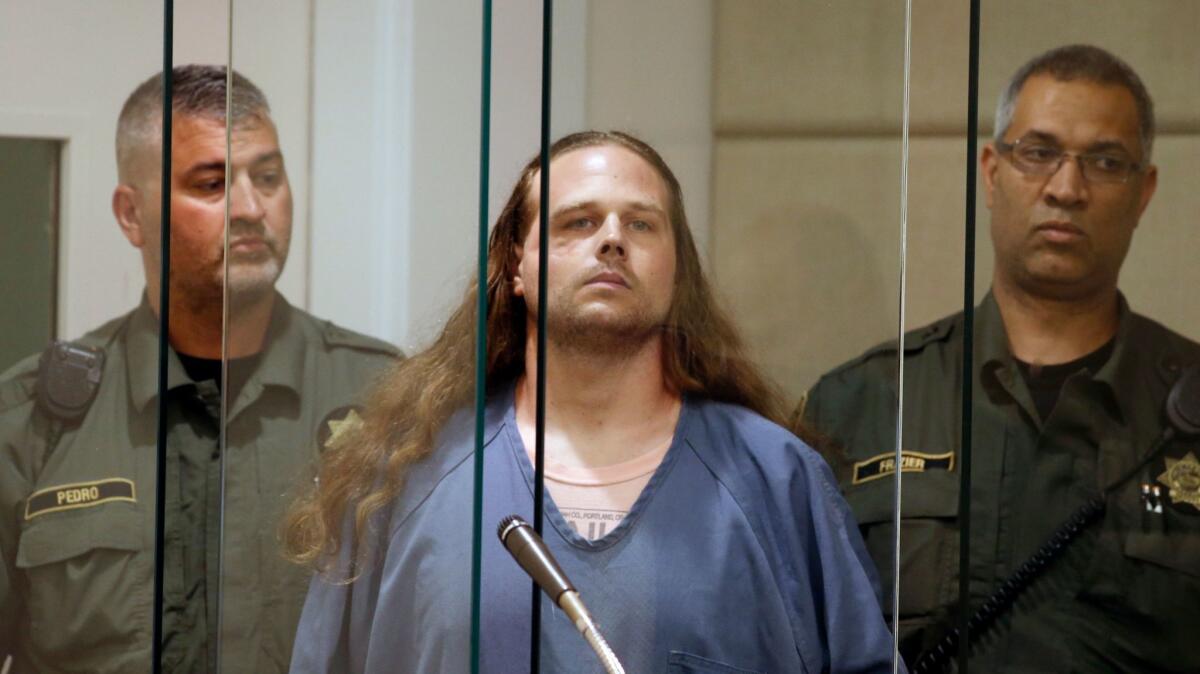Editorial: Curbing free expression is the wrong response to the killings in Portland

- Share via
Portland, Ore., is still shaken by the stabbings that cost two courageous men their lives and seriously injured a third when they came to the defense of two women being subjected to anti-Muslim taunts on a commuter train. But the trauma doesn’t justify a request by Portland’s mayor that the federal government cancel two demonstrations planned for next month by conservative groups.
In making this point, we mean no disrespect to Taliesin Namkai-Meche, Rick Best and Micah Fletcher. As President Trump rightly (if belatedly) observed, the men were “standing up to hate and intolerance” last Friday when they tried to calm Jeremy Joseph Christian, who was shouting anti-Muslim slurs at two teenage girls, one of whom was wearing a Muslim head scarf. Police said Christian stabbed all three men, killing Namkai-Meche and Best and seriously wounding Fletcher.
It’s understandable that citizens and civic leaders in Portland would be traumatized by this horrific crime and wary of hearing more of the sort of hateful rhetoric that preceded it. As Mayor Ted Wheeler put it in a Facebook post: “Our community remains in shock and mourning.”
But Wheeler went too far in urging federal authorities to revoke a permit for a June 4 “Trump Free Speech Rally” on a plaza in downtown Portland and to block a “March Against Sharia” scheduled for June 10. (Wheeler said the city wouldn’t issue its own permits for the events, which he described as “alt-right demonstrations.”)
The trauma doesn’t justify a request by Portland’s mayor that the federal government cancel two demonstrations planned for next month by conservative groups.
Wheeler has also asked the organizers of the demonstrations to stay away voluntarily, which is less problematic. But when a government official uses his power to close off a traditional public forum to a peaceful demonstration — or prevails upon another level of government do so — that undermines the 1st Amendment’s protection of free speech and assembly.
That point was succinctly stated by the ACLU Of Oregon: “It may be tempting to shut down speech we disagree with, but once we allow the government to decide what we can say, see, or hear, or who we can gather with, history shows us that the most marginalized will be disproportionately censored and punished for unpopular speech. If we allow the government to shut down speech for some, we all will pay the price down the line.”
We recognize that such free-speech pieties seem more abstract in a press release, an editorial or a judicial opinion than they do in a real-world environment in which political officials — or university administrators — must worry about the possibility that heated or hateful political speech might inspire violent action. And we know that it’s tempting to solve the problem by preventing the speech in the first place, rather than investing in the resources necessary to ensure that demonstrations remain peaceful and that potentially violent counter-demonstrators don’t exercise a “heckler’s veto.”
Variations of such a veto have already been cast this year at UC Berkeley, Middlebury College and Claremont McKenna College. And it happened last month in Portland: A business association there canceled its annual Avenue of Roses Parade because of fears that two “anti-fascist” groups would disrupt the event if the county Republican Party were allowed to march. The organizers had received an anonymous letter warning: “You have seen how much power we have downtown and that the police cannot stop us from shutting down roads so please consider your decision wisely.”
Finally, because the accused killer in Portland reportedly made bigoted comments online, this incident is likely to embolden those who argue that “hate speech” is a species of violence and unprotected by the 1st Amendment. But the Supreme Court has made it clear that only a few narrow categories of speech aren’t shielded by that section of the Bill of Rights, including “true threats” and incitements to “imminent lawless action” that are likely to cause such action.
“Hate speech” is repugnant but it is also constitutionally protected. So long as they behave peacefully, Americans are free to gather in public and offend whomever they wish. Elected officials such as Mayor Wheeler are likewise free to condemn such speech, but they may not use their power to prevent it from being expressed.
Follow the Opinion section on Twitter @latimesopinion and Facebook
More to Read
A cure for the common opinion
Get thought-provoking perspectives with our weekly newsletter.
You may occasionally receive promotional content from the Los Angeles Times.









